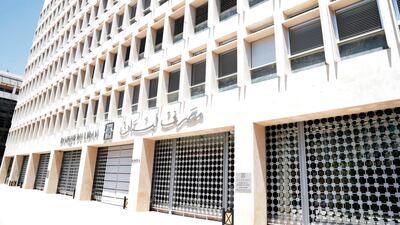Lebanon’s public debt increased 1.3 per cent in the first three months of the year to $86.2 billion (Dh316bn) from the end of 2018.
Lebanon is among the top indebted countries in the world, with a 150 per cent debt to GDP ratio, behind Japan, Greece, Sudan and Venezuela, according to data from the International Monetary Fund (IMF).
In nominal terms, Lebanon’s debt increased $1.1bn in the first quarter of the year, according to Byblos Bank.
The bulk of the country’s debt is denominated in Lebanese pounds totalling about $52.4bn, while foreign currency debt reached $33.8bn. The country’s central bank retained 51.5 per cent of Lebanese denominated debt at the end of March, while commercial banks held about 34.1 per cent of local debt.
Lebanon amassed its public debt following the end of its 15-year civil war in 1990 as it rebuilt the country’s devastated infrastructure. However, subsequent skirmishes with Israel, internal political bickering that left the country without a president or government at different junctures over the past decade for prolonged periods delayed much needed structural reforms.
Lebanese policy makers have traditionally maintained the country can weather uncertainty so long as the pace of economic growth is faster than the rate at which its debt is growing. That was the case from 2007 to 2010 but is no longer the case today. An eight-year war in neighbouring Syria, which saw more than 1 million people seek refuge in Lebanon, has burdened the country’s fiscal position, already sapped by the annual $2bn bill of subsidising the country’s energy company.
The country’s economy is forecast to expand by 1.3 per cent this year, according to the IMF. The Blom Lebanon Purchase Managers' Index, an indicator of private sector business health, rose to 46.7 in April, from 46.3 in March. The index has remained persistently below the 50-plus mark that indicates growth.
Prime Minister Saad Hariri’s government is on the cusp of pushing through a contentious budget for 2019 that has been lambasted by civil servants, pensioners, and employees of the central bank amid fears of salary cuts. The government wants to reduce the fiscal deficit by cutting expenditures in order to access $11bn of aid pledged last year by donors on condition key reforms are implemented. Lebanon’s budget gap reached 11.2 per cent of gross domestic product last year and the government plans to reduce it to just over 8 per cent.

